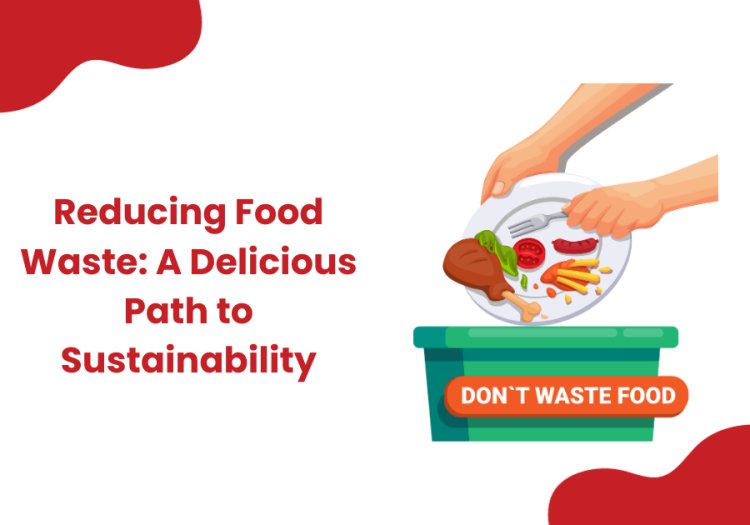Reducing Food Waste: A Delicious Path to Sustainability

Reducing Food Waste: A Delicious Path to Sustainability
Hello, food enthusiasts! Today, we embark on a journey that will not only tantalize our taste buds but also make a substantial impact on our environment – reducing food waste. In this extended blog post, we'll delve deeper into why reducing food waste is essential, explore how to do it, and grab the delightful culinary adventures it leads us on.
So, let's put on our aprons and get ready for an extensive, sustainable culinary expedition!
Introduction: The Alarming Reality of Food Waste
Food is a miracle that sustains us and brings joy to our lives. However, it's disheartening to know that a significant portion of the food we produce never reaches our plates. Food waste is a global problem with far-reaching consequences. It's about time we take action:
The Food Waste Crisis: Food waste goes beyond forgetting about leftovers; it's a global issue with severe environmental, social, and economic repercussions.
The Urgent Call: Reducing food waste isn't just a choice; it's a pressing need. It's about making the most of our resources and minimizing our environmental impact.
1: Unveiling the Shocking Statistics
Before we dive into the solutions, let's take a closer look at the staggering figures:
A Third of All Food Wasted: Shockingly, approximately one-third of the food produced for human consumption goes to waste every year. It's like growing three apples but only eating one.
Environmental Impact: Food waste isn't just about squandering food; it contributes to greenhouse gas emissions and deforestation, making it a significant driver of climate change.
Economic Loss: On a personal level, food waste costs us money. Each time we waste food, it's like throwing our hard-earned money into the trash.
2: Identifying the Culprits of Food Waste
Now, who's to blame for this colossal waste?
Consumers Play a Role: We, the consumers, are significant contributors to food waste. It happens when we buy more than we need, forget about items in the back of our fridges, or let leftovers spoil.
Supermarkets and Restaurants: Food waste isn't just a home issue; it's a systemic problem. Imperfect produce, unsold items, and excess inventory often find their way to the bin.
Agricultural Waste: Even before food reaches the market, tons of produce go to waste due to overproduction or cosmetic imperfections.
3: The Art of Reducing Food Waste
Let's get into the nitty-gritty of how we can make a change:
Smart Shopping: Start by making a shopping list and sticking to it. Buy in quantities that you can consume before food spoils. Embrace the "first in, first out" rule by using older items before newer ones.
Storage Secrets: Learn how to store food properly. From the right temperature for your fridge and freezer to proper pantry storage, this knowledge can extend the life of fresh produce and reduce waste.
Meal Planning: Plan your meals for the week, so you use up ingredients efficiently. Get creative with leftovers! If you have leftover veggie, use it as a flavorful filling for homemade samosas. Simply wrap the veggie in pastry dough and fry or bake for a delicious snack or appetizer.
Repurposing: Turn those overripe bananas into a delectable banana bread or those vegetable scraps into a savory soup. It's all about finding innovative uses for ingredients you might otherwise discard.
Caring for Animals: Instead of disposing of leftover food in the trash, consider sharing it with hungry animals like cows and dogs in your vicinity. This way, your leftovers won't go to waste, and it can serve a useful purpose by providing nourishment to these animals.
Donation: Consider donating non-perishable, unopened items to local food banks. Your generosity can help others while minimizing waste.
4: A Delicious Journey: Reducing Waste Through Culinary Adventures
Now, let's explore how reducing food waste can be an enjoyable journey:
Farm-to-Table: Support local farmers and get fresh, seasonal produce that's less likely to go to waste. You'll not only reduce your carbon footprint but also enjoy the delicious freshness of local ingredients.
Preservation Techniques: Pickling, canning, and preserving are delightful culinary traditions that help extend the life of produce. It's like capturing the flavors of one season to enjoy in another.
Food Sharing: Consider hosting potlucks or food-sharing events with friends and neighbors. It's a wonderful way to use up surplus ingredients, share delicious dishes, and foster a sense of community.
Conclusion: Savor Every Bite, Reduce Waste, and Make a Difference
Reducing food waste isn't just a trend; it's a lifestyle shift that benefits both us and our planet.
By making small changes in our daily routines, we can minimize waste, save money, and enjoy exciting culinary experiments. So, let's savor every bite, reduce waste, and make a positive impact on the world!
At Taskar, we believe in empowering you to make informed choices about your health and well-being. That's why we offer free dietitian consultations at all of our stores. Don't hesitate to reach out to us at 9648480067 or visit taskarmall.com for a wide range of healthcare services tailored to your needs.
Your journey to a healthier you starts with Taskar. Call now and take the first step toward a better, healthier life.
What's Your Reaction?


















